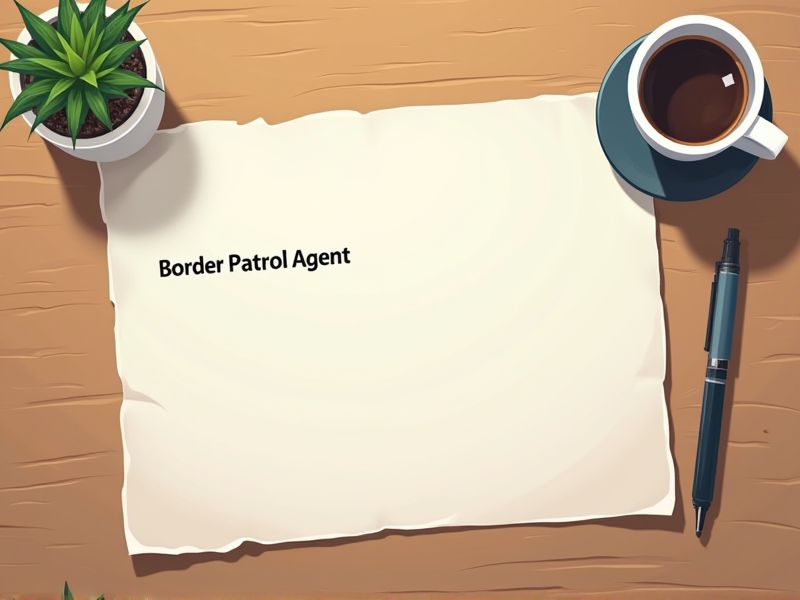
Border Patrol Agents play a critical role in ensuring national security by monitoring and managing borders effectively; to accomplish this, specific certifications are necessary to equip them with the essential skills. Certifications in areas like law enforcement and emergency medical response help agents better handle unpredictable situations and maintain public safety. Increasingly complex immigration laws and international relations also require a deep understanding of cultural competence, necessitating further specialized training. Important certifications for a Border Patrol Agent include those related to these vital skills and knowledge areas.
U.S. Border Patrol Academy Certification
U.S. Border Patrol Academy Certification equips agents with necessary skills and knowledge to handle complex border situations. Rigorous training ensures agents adhere to federal policies and standards, maintaining lawful enforcement. Enhanced situational awareness and decision-making capabilities reduce incidents of misconduct. Certification establishes a benchmark for professional preparedness and accountability in national security roles.
Federal Law Enforcement Training Council (FLETC) Certification
FLETC Certification equips Border Patrol Agents with standardized training that ensures uniformity and effectiveness across federal agencies. The comprehensive curriculum covers legal, physical, and tactical aspects crucial for enforcing border security and handling cross-border crimes. This certification is mandated to maintain high professional standards and accountability in a complex and often dangerous work environment. By receiving FLETC certification, agents are better prepared to handle diverse scenarios, thereby increasing operational safety and efficiency.
Basic Law Enforcement Training Certification
Basic Law Enforcement Training Certification provides essential skills and knowledge for effectively handling complex border security challenges. This certification ensures agents are equipped with legal and tactical expertise necessary to enforce immigration laws and other federal regulations. Officers with this training can better address high-risk situations, reducing potential threats at the border. Certification also establishes a standardized level of professionalism and accountability critical for public trust in border operations.
Firearms Proficiency Certification
Firearms proficiency certification ensures that Border Patrol Agents can effectively handle weapons in high-stakes situations, reducing accidental harm. Mastery of weaponry enhances an agent's confidence and decision-making abilities during encounters with potential threats. Thorough certification processes maintain a standard of skill across the agency, bolstering public trust in their operational capabilities. Consistent training and assessment programs keep agents adept with evolving weapon technologies and tactics, thus aligning their skills with modern enforcement needs.
Defensive Tactics Certification
Defensive Tactics Certification equips Border Patrol Agents with the skills to safely handle confrontational situations, reducing risk to themselves and others. It provides training in non-lethal force techniques, minimizing potential harm during apprehensions. Certification ensures agents understand legal and ethical guidelines, reducing liabilities for the agency. Continuous training enhances agents' confidence and competence, improving overall operational effectiveness at the border.
Emergency Medical Technician (EMT) Certification
Border Patrol Agents often encounter medical emergencies due to the rigorous and hazardous environments they operate in, making EMT certification crucial for immediate response. The specialized training equips them with skills to stabilize individuals experiencing life-threatening conditions until further medical help arrives. Agents frequently deal with migrants who may suffer from dehydration, injuries, or other health issues, requiring a foundational understanding of medical care. EMT expertise enhances an agent's ability to ensure safety and well-being during potentially dangerous interactions or rescue operations.
Crisis Intervention Certification
Crisis Intervention Certification equips Border Patrol Agents with skills to effectively manage tense situations involving individuals experiencing mental health crises. This certification reduces the incidence of escalation by improving agents' communication techniques and understanding of psychological triggers. By having certified agents, the likelihood of achieving safer outcomes for both the agents and those in crisis increases. Implementing this training aligns agents with broader law enforcement practices focused on de-escalation and mental health awareness.
Surveillance and Apprehension Techniques Certification
Surveillance and Apprehension Techniques Certification equips Border Patrol Agents with essential skills for effectively monitoring and securing the border. It enhances their ability to identify and respond to potential threats, ensuring national security. This certification provides agents with updated methodologies and technologies crucial for efficient apprehension operations. Specialized training leads to improved performance and reduced risk during border enforcement activities.
Counterterrorism and Homeland Security Certification
Counterterrorism and Homeland Security Certification enhances a Border Patrol Agent's understanding of potential threats, enabling them to identify risks more efficiently. This specialized knowledge equips agents with skills to effectively respond to and manage situations involving terrorist activities. Training in counterterrorism tactics supports the strategic deployment of resources, optimizing operational effectiveness at the border. With comprehensive certification, agents are better prepared to safeguard national security and manage complex border dynamics.
Cultural Awareness and Diversity Certification
Cultural awareness and diversity certification enables border patrol agents to interact effectively with individuals from various backgrounds, reducing potential miscommunications. This training can lead to fewer conflicts and enhanced cooperation during border operations. Understanding cultural nuances can improve community relations, fostering trust and collaboration with local populations. As demographic trends evolve, agents equipped with this certification are better prepared to uphold human rights and ensure ethical conduct.
Summary
When you become a Border Patrol Agent with additional certifications, your skills and knowledge will significantly expand, enhancing operational efficiency. The acquired expertise often results in more effective crisis management and improved decision-making capabilities. These qualifications frequently lead to increased responsibility and potential advancements within the agency. Training advancements generally contribute to heightened workplace safety and more successful border security operations.
